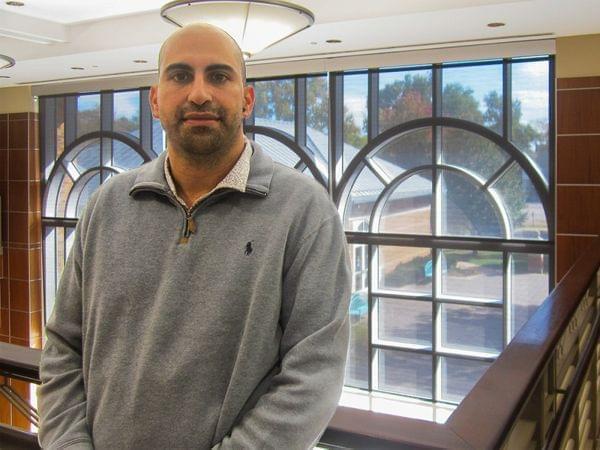Salaita’s Hope Of Teaching At U Of I Continues, One Year After Appointment Withdrawn

Steven Salaita, visiting professor at the American University of Beirut, has gone to court to regain an appointment at the University of Illinois that was rescinded following his controversial tweets about Israel. Jim Meadows/Illinois Public Media
In an interview with Illinois Public Media's Jim Meadows, Stephen Salaita says he hopes to one day teach in the American Indian Studies program at the University of Illinois.
Salaita, who’s suing the university following the withdrawal of his faculty appointment, was in Champaign-Urbana Tuesday for a talk at the Independent Media Center in Urbana.
“It would be wonderful to be reinstated to the position for which I was hired,” said Salaita, who lost his faculty appointment just before it was to begin, following strongly worded tweets he posted about Israel, in the wake of the 2014 Israel-Gaza conflict.
That controversy is the subject of Salaita’s new book, “Uncivil Rites: Palestine and the Limits of Academic Freedom”, published this month by Haymarket Books of Chicago. Salaita took time off from his fall semester at the American University of Beirut to promote the book in the U-S.
In his book, Salaita replies to charges that his tweets expressed anti-Semitic feelings, and violated standards for civility that would damage his effectiveness in the classroom.
Salaita, while saying that he’s always been civil to his students, argues that civility is a concept that’s been used to protest some points of view, and exclude others.
“It’s a term that can be arbitrarily applied to viewpoints that people in power find distasteful or that they find threatening in some way”, Salaita said. “And it can be used to mark those ideas and their speakers as somehow unable to access the respectable spaces of campus.”
Salaita says his tweets, such as "I wish all the ****ing West Bank settlers would go missing" (6/19/14) were expressions of anti-Zionism, but not anti-Semitism. He says criticism of the Israeli government does not equal hostility to Jews, and he opposes any development that would threaten or displace Jews in Israel.
“My ideal outcome would be a secular democratic state in which all communities have equal rights,” said Salaita, “and in fact, come eventually to share, not only a nation but a national identity.”
Salaita says his critics also circulated his harshest tweets, without the context of other tweets that expressed more peaceful messages, such as "Yes, some seek vengeance. Others seek comeuppance. Most of us, however, only ask for simple human compassion." (7/29/14)
Salaita is currently holds a one-year appointment as the Edward W. Said Chair of American Studies at the American University of Beirut, Lebanon, where he’s teaching a mix of American and Arab students. He says he’s enjoying the work, but still hopes to come to the University of Illinois. He says that he hopes for an outcome to his lawsuit against the university that does well for both his supporters and his critics.
“It’s going to take a little bit of work to reconcile those two parties, but it’s certainly not insurmountable,” said Salaita.
Salaita says he doesn’t expect to win his critics around to his point of view. But he wants that view to be understood, saying that it has subject to misconceptions.
Links
- The Lessons Learned From Salaita’s Incendiary Tweets
- Judge Rules That Salaita Lawsuit Against U of I Can Proceed
- AAUP Censures U Of I Over Salaita
- Judge Orders U Of I To Release Salaita Emails
- Prof. Salaita Sues U of I Leaders, Board Of Trustees
- U of I Trustees: Salaita Case Will Not Be Reconsidered
- Academic Freedom Expert Doubts Salaita’s Tenure Status
- Columbia Law Prof Argues For A Salaita Lawsuit, Trustee Kennedy Defends Vote
- Trustees Reject Salaita Hire On 8-1 Vote
- Prof. Salaita Speaks Publicly For First Time About Losing U of I Position
- @stevesalaita Twitter feed
- Salaita's "Uncivil Rites" at Haymarket Books website

